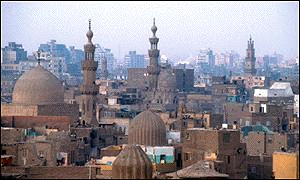|
 Home
Page Home
Page
 The
Concept of Allah (God) The
Concept of Allah (God)
 What
is Islam? What
is Islam?
 Main
Pillars of Islam Main
Pillars of Islam
 Muslim
World Population Muslim
World Population
 The
Universal Religion The
Universal Religion
 Muhammad
(Peace Be Upon Him) Muhammad
(Peace Be Upon Him)
 Relevance Relevance
 Women
in Islam Women
in Islam
 The
Concept of Peace and War The
Concept of Peace and War
 Tolerance
in Islam Tolerance
in Islam
 Islam
and Cleanliness Islam
and Cleanliness
 Other
Religions Other
Religions
 Islam's
contribution to Humanity Islam's
contribution to Humanity
 Islam
and Knowledge Islam
and Knowledge
 Human
Rights in Islam Human
Rights in Islam
 History History
 sources sources
 Favorite
Links Favorite
Links
 Photo
Album Photo
Album
 About
Us About
Us

Cairo - The City of a Thousand mosques


|
- 1. The
Qur'an
-
- The Qur'an is
the faithful and complete recording of all revelation
that came in the form of divine inspiration to Prophet
Muhammad. It is a record of the exact words
revealed by God through the Angel Gabriel
to the Prophet Muhammad. It was memorized by
Muhammad, and then dictated to his Companions and
written down by scribes who cross-checked it during his
lifetime. Not one word of its 114 chapters, has
been changed over the centuries, so that the
Qur'an is in every detail the unique and
miraculous text which was revealed to Muhammad
fourteen centuries ago.
-
- The Qur'an
therefore is the prime source of every Muslim's faith and
practice. It deals with all the subjects which concern us
as human beings: wisdom, doctrine, worship, and law, but
its basic theme is the relationship between God
and His creatures. At the same time it provides
guidelines for a just society, proper human conduct and
an equitable economic system.
-
- The language of the
revelation was Arabic. The process of revelation
involved vision as well as audition.
-
- The word
Qur'an itself means "recitation." It was in this
recited form that Muhammad conveyed it to his
followers. This book was kept in two ways; the first was
by memorizing, and the second by writing.
-
- The Qur'an is
meant to be recited and to be heard, in order to be fully
experienced.
-
- It is impossible to
convey the majesty and power of the Arabic
recitation in any other language in which the
Qur'an might be rendered. The power of the Word of
God for a Muslim lies not only in its impact on
the mind, but also on the heart.
-
- So The Qur'an,
is the last revealed Word of God, its the prime
source of every Muslim's faith and practice. It deals
with all the subjects which concern us as human beings:
wisdom, doctrine, worship, and law, but its basic theme
is the relationship between God and His creatures.
At the same time it provides guidelines for a just
society, proper human conduct and an equitable economic
system.
-
- 2.
Sunnah(Prophet's Traditions)
-
-
- Hadith are the
standardized reports of what Prophet Muhammad did,
said,and agreed upon, transmitted by his Companions, or
members of his family. These traditions were then passed
on to succeeding generations. These Hadiths and
the chain of transmitters were in turn submitted to tests
of authentication to enable scholars to judge the
relative validity of the accounts.
-
- The corpus thus
constitutes an important source of values in
Islam. For Muslims, these Hadiths are a
model and represent an ideal pattern, referred to as the
Sunnah, meaning customs or practices of the
Prophet. The Sunnah provides Muslims with patterns
they can emulate. In so doing, they look to
Muhammad as an exemplary human being, who had
realized in his own life the ideals of Islam
revealed by Allah (God). So Belief in the
sunnah is part of the Islamic faith .
-
So the Sunnah, is
the practice and example of the Prophet, and it is the
second authority for Muslims. A Hadith is a reliably
transmitted report of what the Prophet said, did, or
approved. Belief in the Sunnah is part of the Islamic
faith.
Examples of the
Prophet's sayings:
The Prophet said:
- 'God has no
mercy on one who has no mercy for
others.'
- 'None
of you truly believes until he wishes for his brother
what he wishes for
himself.'
- 'He
who eats his fill while his neighbor goes without food is
not a believer. '
- 'The
truthful and trusty businessman is associated with the
prophets the saints, and the
martyrs.'
- 'Powerful
is not he who knocks the other down, indeed powerful is
he who controls himself in a fit of anger.
'
- 'God
does not judge according to your bodies and appearances
but He scans your hearts and looks into your
deeds.'
|


![]()